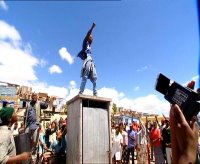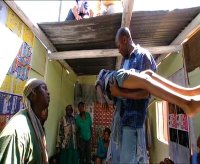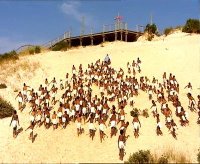Das Neue Evangelium (The New Gospel, 2020)

Labels: African Bible Films, Documentaries, Gospel According to St. Matthew, Italian Bible Films, Pasolini
Looking at film interpretations of the stories in the Bible - past, present and future, as well as preparation for a future work on Straub/Huillet's Moses und Aron and a few bits and pieces on biblical studies.

Labels: African Bible Films, Documentaries, Gospel According to St. Matthew, Italian Bible Films, Pasolini
Lo stesso Gesù viene rappresentato volutamente secondo canoni antispettacolari, in atteggiamento quasi sempre meditabondo, a viso semi-coperto, mentre snocciola frasi celebri nel modo meno enfatico possibile.Often Jesus' representation is deliberately according to anti-spectacular traditions: in attitude, almost always brooding; his face half covered, while he rattles off celebrated phrases in the least emphatic manner possible. (translation mine).1
=========
1 - Centola, Riccardo (2015) "21 MFF Histoire de Judas" at Cinemafrica, 11 November. Available online: http://www.cinemafrica.org/spip.php?article1603
2 - Frodon, Jean-Michel (2015), “An Interview with Rabah Ameur-Zaïmeche,” in Sarrazink Productions (ed.), Presskit for Story of Judas. Available online: https://medias.unifrance.org/medias/7/42/141831/presse/story-of-judas-presskit-french.pdf
3 - Frodon, "Interview"
4 - In Last Temptation Judas does this only after Jesus' emphatic instructions to do so. It's hardly what could be called a betrayal.
5 - Ameur-Zaïmeche, Rabah (2015) "Director’s Note" in Sarrazink Productions (ed.), Pressbook for "Story of Judas". Available online: https://medias.unifrance.org/medias/44/47/143148/presse/story-of-judas-presskit-english.pdf
6 - Zwick, Reinhold (2021) "Inculturation and Actualization: Rabah Ameur-Zaïmeche’s Histoire de Judas" in Walsh, Richard (ed.) T&T Clark Handbook of Jesus and Film, London: Bloomsbury T&T Clark. p.69
7 - Frodon, "Interview"
8 - Frodon, "Interview"
9 - Not only does Frodon ask Ameur-Zaïmeche about this in the press-pack interview, but both Centalo and Zwick (p.67) have also questioned this decision/choice/move.
Labels: African Bible Films, French Bible Films, Islamic Jesus Films, Judas
It's been 11½ years since I last posted on the Bible Films podcast. Podcasting has come an awful long way in that time - to the extent that I'm somewhat embarrassed by the older entries, but I've been wanting to return to it for a long time, and to try a new, more conversational approach.
So I'm delighted to have just posted a discussion about the recently released Lamentations of Judas a fantastic part drama-part documentary which tells both the story of Jesus and the modern(ish) day story of some of the combatants in the Angolan Civil War.
It's a very special film typified by the kind of natural lighting and straw-tinted landscapes that made films such as Timbuktu (2014) and Wallay (2017) so special.
This time round I'm in discussion with Melanie Pegge most widely known as an artist, musician, but an art psychotherapist by profession. As some of the film's publicity talked about how it was the process of re-enacting the story of Jesus' betrayal that enabled these former soldiers to open up about their experiences and subsequent rejection I thought Mel would bring a fascinating perspective to the film and indeed she does.
Please have a listen and please, if you could, "like and share" that would be fantastic. My old podcast channel currently only has a couple of votes and, as one of those is a "one-starrer", it doesn't encourage others to give it a chance! You can find it at one of these places:
Labels: African Bible Films

Labels: African Bible Films, Italian Bible Films, Modernisations

Labels: African Bible Films, Nigerian Bible Films



Labels: African Bible Films, Dinah, Genèse, Genesis, Jacob, Joseph (Genesis)
 Having looked at The Red Tent last month I thought I'd things off with a quick look at how different films portray the incident with Dinah, her brothers and the Shechemites. Given that it's a relatively obscure part of Genesis, it has only been covered a few times on the screen, but there are some significant variations between the four depictions with which I am familiar.
Having looked at The Red Tent last month I thought I'd things off with a quick look at how different films portray the incident with Dinah, her brothers and the Shechemites. Given that it's a relatively obscure part of Genesis, it has only been covered a few times on the screen, but there are some significant variations between the four depictions with which I am familiar.
Labels: African Bible Films, Bible Collection (The), Dinah, Genèse, Genesis, Red Tent
 Occasionally I post things here just so I know where to find them later (I do also use Delicious, but try not to overcrowd it).
Occasionally I post things here just so I know where to find them later (I do also use Delicious, but try not to overcrowd it).Labels: African Bible Films
 For some reason the story of Joseph has never really appealed to me. Perhaps it's just that it's never really clear what, if anything, Joseph learns along the way; or that the story seems to skip by the interesting parts of the story early on, but spends an age over the film's protracted conclusion. So my hopes for Youssef Chahine's Al-Mohager (The Emigrant) were not particularly high, even though the synopsis on the back of the DVD promised to tell the story from the Egyptian perspective, rather than the Hebrew.
For some reason the story of Joseph has never really appealed to me. Perhaps it's just that it's never really clear what, if anything, Joseph learns along the way; or that the story seems to skip by the interesting parts of the story early on, but spends an age over the film's protracted conclusion. So my hopes for Youssef Chahine's Al-Mohager (The Emigrant) were not particularly high, even though the synopsis on the back of the DVD promised to tell the story from the Egyptian perspective, rather than the Hebrew. The end result is that Chahine and Khaled El Nabaoui, his leading man, craft a Joseph figure that we can really care about. He still has something of a superiority complex, but his desire to improve on his life, rather than simply settling for his family's hand-to-mouth existence, becomes his driving force. He decides that he wants to discover how to farm the land rather than wander from place to place and it's the start of Joseph's interest in agriculture. The Bible's never really clear how Joseph became such a brilliant agricultural strategist, but this idea is perhaps this film's biggest concern.
The end result is that Chahine and Khaled El Nabaoui, his leading man, craft a Joseph figure that we can really care about. He still has something of a superiority complex, but his desire to improve on his life, rather than simply settling for his family's hand-to-mouth existence, becomes his driving force. He decides that he wants to discover how to farm the land rather than wander from place to place and it's the start of Joseph's interest in agriculture. The Bible's never really clear how Joseph became such a brilliant agricultural strategist, but this idea is perhaps this film's biggest concern. Having succeeded, however, he is drawn back towards the city and Simihit, his master's wife. Simihit also happens to be the high priestess of the local cult and, as her husband is a eunuch, she looks to Ram for fulfilment. As in the biblical version of the story she makes a pass at Joseph and quickly tries to cover her tracks by claiming he was forcing himself on her, but here she relents shortly afterwards, meaning that Joseph's time in jail is significantly shorter than we are used to. Having regained his freedom he now has the requisite experience to be able to advise on national agricultural policy. It's still a bit of a leap, but it seems much more understandable given his love for, and understanding of, farming.
Having succeeded, however, he is drawn back towards the city and Simihit, his master's wife. Simihit also happens to be the high priestess of the local cult and, as her husband is a eunuch, she looks to Ram for fulfilment. As in the biblical version of the story she makes a pass at Joseph and quickly tries to cover her tracks by claiming he was forcing himself on her, but here she relents shortly afterwards, meaning that Joseph's time in jail is significantly shorter than we are used to. Having regained his freedom he now has the requisite experience to be able to advise on national agricultural policy. It's still a bit of a leap, but it seems much more understandable given his love for, and understanding of, farming. Aside from El Nabaoui's performance and the innovative handling of the original text, the film also owes a lot to Chahine's eye for a good image and his ability to evoke so strongly nomadic and civil life in the Egyptian region almost four thousand years ago. There's much that's alien about the world that Chahine takes us to, yet much that is also familiar. It's also good to see the story acted out by characters who are racially similar to the original characters.
Aside from El Nabaoui's performance and the innovative handling of the original text, the film also owes a lot to Chahine's eye for a good image and his ability to evoke so strongly nomadic and civil life in the Egyptian region almost four thousand years ago. There's much that's alien about the world that Chahine takes us to, yet much that is also familiar. It's also good to see the story acted out by characters who are racially similar to the original characters.Labels: African Bible Films, Genesis, Joseph (Genesis)
 Ever since my review and scene guide for Jezile (Son of Man) I’ve been meaning to post something specifically about the various speeches Jesus gives in the film. Jesus’s speeches in this film are more political than any other Jesus film I can think of, and this has been considered one of the reasons why the film has yet to have a wide release in the US. Claiming a political stance for Jesus is a risky business (although that doesn’t seem to stop many people), but I think this film does it reasonably well. Whilst it may look on the surface like this film’s Jesus makes ‘political’ speeches as opposed to the ‘spiritual’ ones of the gospels, I want to examine the two key speeches in the film to see exactly what they do say and how much of it has a basis in the source texts. (Inevitably this list will not be exhaustive).
Ever since my review and scene guide for Jezile (Son of Man) I’ve been meaning to post something specifically about the various speeches Jesus gives in the film. Jesus’s speeches in this film are more political than any other Jesus film I can think of, and this has been considered one of the reasons why the film has yet to have a wide release in the US. Claiming a political stance for Jesus is a risky business (although that doesn’t seem to stop many people), but I think this film does it reasonably well. Whilst it may look on the surface like this film’s Jesus makes ‘political’ speeches as opposed to the ‘spiritual’ ones of the gospels, I want to examine the two key speeches in the film to see exactly what they do say and how much of it has a basis in the source texts. (Inevitably this list will not be exhaustive).Speech 1 (~30 mins)The occupiers and elders blame the people for the robbery, unrest and killing. Unrest is due to poverty, overcrowding and lack of education. We must prove to them that we are committed to non violent change. Then negotiations can begin. We must not let ourselves be corrupted, but rather fight poverty, epidemics and thuggery. Listen, listen..Each human life is important. It’s our right to protect our beliefs…
But this never becomes the right to kill.
We don’t need weapons to fight this battle
[The disciples hand in their guns]
 This is perhaps the least sourceable of the speeches Jesus gives. Even so there are echoes of John 11:47-48 in the first sentence, Matt 26:52 in the third (although this verse needs to be balanced with Luke 22:36 & 38), and Matt 5:48 in the fifth. The line “this never becomes the right to kill” is clearly linked to not only the sixth commandment, but also Jesus’s teaching on how this should be expanded (Matt 5:21-22; 38-39; 43-44). Whilst these verses have certainly been selected to bolster a certain point of view, there’s no doubt that they are in the screenwriter’s mind. The call to the disciples to leave their former lives behind them also evokes the stories of Matthew/Levi and Zaccheus
This is perhaps the least sourceable of the speeches Jesus gives. Even so there are echoes of John 11:47-48 in the first sentence, Matt 26:52 in the third (although this verse needs to be balanced with Luke 22:36 & 38), and Matt 5:48 in the fifth. The line “this never becomes the right to kill” is clearly linked to not only the sixth commandment, but also Jesus’s teaching on how this should be expanded (Matt 5:21-22; 38-39; 43-44). Whilst these verses have certainly been selected to bolster a certain point of view, there’s no doubt that they are in the screenwriter’s mind. The call to the disciples to leave their former lives behind them also evokes the stories of Matthew/Levi and Zaccheus Speech 2 (~ 37 mins)
We are too busy with modern trivialities as if they are the most important things. If you constantly find fault with yourself, you will lose the struggle with real sin. All authority is not divinely instituted. If you follow me we will have peace.
I’m not here to destroy beliefs and traditions but to create them anew. We must forgive those who offend us and those who trample on our comrades, otherwise our hatred will destroy our future.
When those with imperial histories pretend to forget them, and blame Africa’s problems on tribalism and corruption, while building themselves new economic empires, I say we have been lied to. Evil did not fall.
When I hear someone was beaten and tortured in the Middle East I say we have been lied to. Evil did not fall.
When I hear that in Asia child labour has been legislated for I say we have been lied to. Evil did not fall.
When politicians in Europe and the USA defend trade subsidies and help restrict the use of medicine through commercial patents I say we have been lied to. Evil did not fall
When you are told, and you will be, that people just “disappear” you must say we have been lied to. And evil will fall.
 On balance, I personally see the various words from the Sermon on the Mount, and Jesus’s example as he is arrested, tortured and killed, as outweighing the verses that are routinely used to argue for violent / military methods on occasion. I have to admit, however, that the Luke 22 verses trouble me. But then it’s easy to sit in my ivory tower and pontificate about such things. What Dornford-May and co. have done is take a radical message about non-violence to a context where the words of Jesus still need to be heard.
On balance, I personally see the various words from the Sermon on the Mount, and Jesus’s example as he is arrested, tortured and killed, as outweighing the verses that are routinely used to argue for violent / military methods on occasion. I have to admit, however, that the Luke 22 verses trouble me. But then it’s easy to sit in my ivory tower and pontificate about such things. What Dornford-May and co. have done is take a radical message about non-violence to a context where the words of Jesus still need to be heard.
 Having reviewed Mark Dornford-May's Son of Man a fortnight ago, I now want to examine the passages from the bible it utilises. This is slightly more complicated than usual as the modernisation necessarily distorts some of the passages. It's also difficult because the imaginative treatment of Jesus's death is a more symbolic treatment of the events than a literal modernisation, but more of that below.
Having reviewed Mark Dornford-May's Son of Man a fortnight ago, I now want to examine the passages from the bible it utilises. This is slightly more complicated than usual as the modernisation necessarily distorts some of the passages. It's also difficult because the imaginative treatment of Jesus's death is a more symbolic treatment of the events than a literal modernisation, but more of that below.Temptation - (Matt 4:1-11)Notes
[extra-biblical episodes]
Annunciation - (Luke 1:26-38)
Magnificat - (Luke 1:46-55)
Birth of Jesus - (Luke 2:1-7)
Shepherds and Angels - (Luke 2:8-20)
Wise Men - (Matt 2:1,11)
Joseph Warned - (Matt 2:13-5)
Slaughter of the Infants - (Matt 2:16)
Baptism - (Mark 1:9-11)
Calling the 12 - (Mark 3:13-19)
Death of Herod - (Matt 2:19)
[Various Teaching]
[extra-biblical episode - amnesty]
Adulteress - (John 8:2-11)
Jesus Anointed by a Woman - (John 12:1-8)
Judas' Agrees to Betray - (Mark 14:1-10)
[Various Teaching]
Jesus Predicts his Death - (Mark 8:31)
Healing of a Paralytic - (Mark 2:1-12)
[Various Teaching]
Raising of Lazarus - (John 11:1-44)
Exorcism of Young (Wo)man - (Mark 9:14-29)
"Sermon on the Mount"
[extra-biblical episode]
Jesus and the children - (Mark 10:13-16)
Triumphal Entry - (Mark 11:1-10)
Conflict with the Elders - (John
[extra-biblical episode]
Pilate and the Elders - (John 18:28-31)
Last Supper - (Mark 14:17-25)
Jesus Predicts Peter's Denial - (Mark 14:26-31)
Gethsemane - (Mark 14:32-42)
Arrest of Jesus - (Mark 14:43-50)
Beating and Mocking - (Mark 14:65)
Peter's Denial - (Mark 14:66-72)
Burial of Jesus
Death of Jesus
"Resurrection"
Crucifixion
Ascension
 The following paragraph contains spoilers. As referred to above, the most inventive re-interpretation in the film is the events of Jesus's final week. In order to create a credible scenario, and to fashion the most compelling message for it's audience, Dornford-May moulds the arrest and death of Jesus into that of modern, African, minority-resistance leaders. So the narrative departs from the biblical order of events as early as the Triumphal Entry. Immediately afterwards Jesus meets with Caiaphas and Annas ("The Elders") in the parallel of the Sanhedrin (or not) trial scenes. Pilate then meets with the elders and agrees to turn a blind eye to their actions regarding Jesus - washing his hands in the process. The film then moves to the Last Supper and Gethsemane and Jesus's arrest. However, when Jesus is mocked and beaten, he is beaten into a coma, and then placed in the grave, and then shot. It is left unclear as to whether Jesus dies from the beating or from the shooting.
The following paragraph contains spoilers. As referred to above, the most inventive re-interpretation in the film is the events of Jesus's final week. In order to create a credible scenario, and to fashion the most compelling message for it's audience, Dornford-May moulds the arrest and death of Jesus into that of modern, African, minority-resistance leaders. So the narrative departs from the biblical order of events as early as the Triumphal Entry. Immediately afterwards Jesus meets with Caiaphas and Annas ("The Elders") in the parallel of the Sanhedrin (or not) trial scenes. Pilate then meets with the elders and agrees to turn a blind eye to their actions regarding Jesus - washing his hands in the process. The film then moves to the Last Supper and Gethsemane and Jesus's arrest. However, when Jesus is mocked and beaten, he is beaten into a coma, and then placed in the grave, and then shot. It is left unclear as to whether Jesus dies from the beating or from the shooting.  However, then his mother Mary learns of the location of Jesus's body and releases him from the grave (a "resurrection" of sorts). Mary then displays his body on a cross - the significance of which is discussed in my review. Finally, we see Jesus climbing a hill with a host of the feathered angel boys - a scene of ascension. The result is a iconic yet modernised depiction of the events of Christ's death which relies on visual and thematic similarities for its points of comparison rather than strict adherence to the original narratives.
However, then his mother Mary learns of the location of Jesus's body and releases him from the grave (a "resurrection" of sorts). Mary then displays his body on a cross - the significance of which is discussed in my review. Finally, we see Jesus climbing a hill with a host of the feathered angel boys - a scene of ascension. The result is a iconic yet modernised depiction of the events of Christ's death which relies on visual and thematic similarities for its points of comparison rather than strict adherence to the original narratives. I want to revisit the various blocks of teaching in a later post, as in most cases it has been radically revised. Essentially, each section of teaching pieces together a number of disparate phrases from the gospels, and then updates them so they form coherent sermons to the modern world he inhabits. That said one speech is delivered to a crowd from the top of an iron shack - a subtle reference to the Sermon on the Mount.
I want to revisit the various blocks of teaching in a later post, as in most cases it has been radically revised. Essentially, each section of teaching pieces together a number of disparate phrases from the gospels, and then updates them so they form coherent sermons to the modern world he inhabits. That said one speech is delivered to a crowd from the top of an iron shack - a subtle reference to the Sermon on the Mount.Labels: African Bible Films, Jezile (Son of Man 2006), Modernisations, Scene Guides